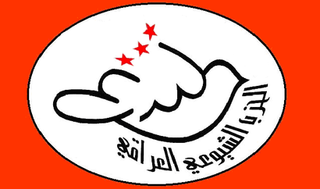Related Research Articles

The International Confederation of Free Trade Unions (ICFTU) was an international trade union. It came into being on 7 December 1949 following a split within the World Federation of Trade Unions (WFTU), and was dissolved on 31 October 2006 when it merged with the World Confederation of Labour (WCL) to form the International Trade Union Confederation (ITUC).

The Iraqi National Congress is an Iraqi political party that was led by Ahmed Chalabi who died in 2015. It was formed as an umbrella opposition group with the aid and direction of the United States' government following the Persian Gulf War, for the purpose of fomenting the overthrow of longtime Iraqi President Saddam Hussein.

The Iraqi National Accord, known inside Iraq as Wifaq, is an Iraqi political party founded by Iyad Allawi, Tahsin Muallah and Salah Omar al-Ali in 1991.

Jay Montgomery Garner is a retired United States Army lieutenant general who in 2003 was appointed as Director of the Office for Reconstruction and Humanitarian Assistance for Iraq following the 2003 invasion of Iraq, making him the immediate replacement of Saddam Hussein as the de facto head of state of Iraq. Garner was soon replaced by Ambassador Paul Bremer and the ambassador's successor organization to ORHA, the Coalition Provisional Authority (CPA).

Ayad Allawi is an Iraqi politician. He served as the vice president of Iraq from 2014 to 2015 and 2016 to 2018. Previously he was interim prime minister of Iraq from 2004 to 2005 and the president of the Governing Council of Iraq in 2003.

Mowaffak Baker al-Rubaie is an Iraqi politician, and was Iraq National Security Advisor in the government of Prime Minister Ayad Allawi and in 2005–2006 Prime Minister Ibrahim Al Jaafari and 2006–2009 Prime Minister Nouri al-Maliki. He was elected to the Iraqi Council of Representatives in December 2005 as a nominee of the United Iraqi Alliance and from 2014–2018 in the Iraqi Parliament.

Ali Abdul-Amir Allawi was Iraq's Deputy Prime Minister and Finance Minister.

The Iraqi Communist Party is a communist party and the oldest active party in Iraq. Since its foundation in 1934, it has dominated the left in Iraqi politics. It played a prominent role in shaping the political history of Iraq between its foundation and the 1970s. The Party was involved in many of the most important national uprisings and demonstrations of the 1940s and 1950s. It suffered heavily under the Ba'ath Party and Saddam Hussein but remained an important element of the Iraqi opposition and was a vocal opponent of the United Nations sanctions imposed on Iraq after the Gulf War of 1991. It opposed the United States invasion of Iraq in 2003 but since then has participated in the new political institutions. It received little support in the Iraqi general elections of 2005. The party gained some seats in each province in which the 2013 Iraqi governorate elections were held.

An Iraqi insurgency began shortly after the 2003 American invasion deposed longtime leader Saddam Hussein. It is considered to have lasted until the end of the Iraq War and U.S. withdrawal in 2011. It was followed by a renewed insurgency.
Hazim al-Shaalan al-Khuzaei was Iraq's Defence Minister from June 2004 until May 2005 under the Iraqi Interim Government of Ayad Allawi.
Under the Iraqi constitution of 1925, Iraq was a constitutional monarchy, with a bicameral legislature consisting of an elected House of Representatives and an appointed Senate. The lower house was elected every four years by manhood suffrage. The first Parliament met in 1925. Ten general elections were held before the overthrow of the monarchy in 1958.
The General Federation of Trade Unions (GFTU) was a major federation of trade unions in Iraq prior to 2005, when it merged with the Iraqi Federation of Trade Unions and the General Federation of Iraqi Trade Unions to the General Federation of Iraqi Workers.

The Iraqi Accord Front or Iraqi Accordance Front also known as Tawafuq is an Iraqi Sunni political coalition created on October 26, 2005 by the Iraqi Islamic Party to contest the December 2005 general election. As a large section of Iraq's Sunnis are composed by the populous Kurds, situated in northern Iraq and locally autonomous, the party's members are mostly Arab, and as such, its political efforts have largely been focused on protecting this community's interests as opposed to Iraq's non-Sunni population. In the 2005 election, its platform called for ending the US occupation of Iraq, revision of the new Iraqi constitution, repeal of the de-Ba'athification laws that had cost many Sunnis their government jobs and the restoration of the Iraqi Army, which was dissolved after the US overthrow of Saddam Hussein and which had a Sunni dominated officer corps. Despite this, the party has maintained that it is non-secular, even though the Ba'ath Party contained many prominent Sunnis.
Founded in October 2005 from unions that had begun organizing after the invasion, the Federation of Oil Unions of Iraq is the largest independent union consortium in Iraq, with tens of thousands of members. It fully opposed the American occupation of Iraq.

The Federation of Workers Councils and Unions in Iraq (FWCUI) is the second largest union federation in Iraq.

Thamir Abbas Ghadhban is an Iraqi civil servant and politician.
Safia Taleb Ali al-Suhail is an Iraqi politician who currently serves as an Ambassador of Iraq to Saudi Arabia, having previously served as the ambassador to Italy and Jordan. She was appointed the first female ambassador of Iraq in Oman in 2004, and she held important political and diplomatic positions in the country, including: a member of the Iraqi parliament for two parliamentary sessions on the capital Baghdad in the period 2005-2014, and the head of the Europe Department in the Iraqi Ministry of Foreign Affairs from 2014-2016, and the ambassador of the Republic of Iraq. To the Hashemite Kingdom of Jordan in the period 2016-2019 ”, She was a former member of the Council of Representatives of Iraq who was elected in December 2005 for the secular Iraqi National List.

The International Federation of Trade Unions was an international organization of trade unions, existing between 1919 and 1945. IFTU had its roots in the pre-war IFTU.

Relations between the Arab Republic of Iraq and State of Palestine have historically been close, with Palestinian Liberation Organization supported by the Ba'athist Iraqi regime during the second half of the 20th century, and vice versa, Iraqi Ba'athist regime supported by PLO leadership during the Gulf War. The State of Palestine has an embassy and consulate in Baghdad and Erbil accordingly, but Iraq doesn't have an embassy in Palestine.
Malas Mohammad Abdulkarim al-Husseini al-Kasnazani is an Iraqi politician who was the Trade Minister from September 2014 until December 2015 under Prime Minister Haider al-Abadi.
References
- 1 2 3 4 Leyshon, Traven; Feeley, Dianne (2005). "Solidarity with Iraqi Labor". Against the Current. Retrieved 2021-07-04.
- 1 2 "2010 Annual Survey of violations of trade union rights - Iraq". The UN Refugee Agency. International Trade Union Confederation. 2010-06-09. Archived from the original on 2018-02-24. Retrieved 2021-07-04.
- ↑ "Worldwide". International Union Rights. 11 (1): 26–27. 2004. JSTOR 41936194 . Retrieved 2021-07-04.
- ↑ "2Interim Report - Report No 338, November 2005". International Labour Organization. 2004-05-15. Retrieved 2021-07-04.
- 1 2 3 Hyland, Julie (2004-11-25). "How Britain's trade unions support occupation of Iraq". World Socialist Web Site. Retrieved 2021-07-04.
- 1 2 3 4 5 6 7 8 Bacon, David (2005-09-01). "Between soldiers and bombs: Iraq's fledgling labor movement". Multinational Monitor. 26 (9/10): 37–40. ProQuest 208877592 . Retrieved 2021-07-04.
- 1 2 3 4 5 "Iraq: Assassinations and kidnappings of several trade unionists". OMCT. 2005-02-28. Retrieved 2021-07-04.
- 1 2 3 Muhsin, Abdullah (2005-04-22). "We are building a democratic Iraq". Blackpool Tribune. 69 (16): 10–11. ProQuest 1851590677 . Retrieved 2021-07-04.
- 1 2 Bacon, David (2010-08-31). "Is U.S. Pulling Plug on Iraqi Workers?". Labor Notes. Retrieved 2021-07-04.
- 1 2 Lydersen, Kari (2010-07-26). "Iraqi Electricity Union Offices Raided Under Minister's Draconian Decree". In These Times. Retrieved 2021-07-04.
- ↑ Bader-Blau, Shawna (2007). "Iraqi unions vs Big Oil". Middle East Report (243): 16–21. JSTOR 25164787 . Retrieved 2021-07-04.
- ↑ Beling, Willard A. (1961). "Political Trends in Arab Labor". Middle East Journal. 15 (1): 29–39. JSTOR 4323315 . Retrieved 2021-07-04.
- 1 2 "Iraq's third big issue". Independent Labour Publications. 2009-03-25. Retrieved 2021-07-04.
- 1 2 Ramadani, Sami (2004-10-26). "Collaboration won't buy Iraq's freedom". The Guardian. Retrieved 2021-07-04.
- 1 2 Bacon, David (2005). "Unions at war". International Union Rights. 12 (3): 19–20. JSTOR 41937383 . Retrieved 2021-07-04.
- 1 2 3 4 Bacon, David (September 2005). "Iraqi labor facing occupation, insurgency: An update". Dollars & Sense (261): 14–15. Retrieved 2021-07-04. – via EBSCO 's Academic Search Complete (subscription required)
- ↑ Harwood, Matthew (April 2005). "Pinkertons at the CPA". Washington Monthly. 37 (4): 24–27. Retrieved 2021-07-05. – via EBSCO 's Academic Search Complete (subscription required)
- 1 2 Letwin, Michael (2007-06-05). "General Federation of Iraqi Workers — Against the Occupation of Iraq?". MR Online. Archived from the original on 2021-05-15. Retrieved 2021-07-04.
- ↑ al-Ansary, Khalid (2009-01-03). "U.S.-installed Iraqi ex-PM says Bush "utter failure"". Reuters. Retrieved 2021-07-04.
- 1 2 3 "Ictur in action: Interventions". International Centre for Trade Union Rights. 11 (1): 14–15. 2004. JSTOR 41936188 . Retrieved 2021-07-04.
- 1 2 Bacon, David (2004). "Privatized Iraq: Imposed economic and social policies raise human rights questions". Race, Poverty & the Environment. 11 (1): 46–49. JSTOR 41554428 . Retrieved 2021-07-04.
- ↑ "IFTU resolves to reclaim Baghdad office". LabourNet UK. Iraq Solidarity Campaign. 2004-08-04. Retrieved 2021-07-04.
- 1 2 3 4 "Book Celebrates Determined Comrades Fighting for Free Iraqi Trade Unions". IndustriALL Global Union. 2006-08-07. Retrieved 2021-07-04.
- ↑ "Another Iraqi Trade Unionist Kidnapped". Scoop. Iraqi Federation of Workers' Trade Unions. 2005-02-21. Retrieved 2021-07-04.
- 1 2 3 "Statement of the World Organisation Against Torture" (PDF). OMCT. 2005-06-13. Archived from the original (PDF) on 2021-07-05. Retrieved 2021-07-04.
- ↑ "Iraqi trade unionist kidnapped". Workers' Liberty. 2005-01-29. Retrieved 2021-07-04.
- ↑ "Kidnapped Iraqi Trade Union Leader Free". IndustriALL Global Union. 2005-07-19. Retrieved 2021-07-04.
- 1 2 "Iraq: Murder of union member in Baghdad". Scoop. Iraqi Federation of Workers' Trade Unions. 2005-03-02. Retrieved 2021-07-04.
- 1 2 "Workers Blood For Oil". Workers Online. 2006. Retrieved 2021-07-04.